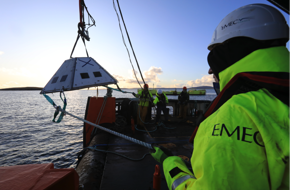Highlights
- First and only centre of its kind in the world which provides developers of both wave and tidal energy converters with purpose-built, accredited open-sea testing facilities.
- Pioneering the development of a green hydrogen economy in Orkney.
- Provides demonstration, technical and commercial support to wave, tidal, hydrogen, floating offshore wind and energy systems sectors.
- Commitments to sustainability and work adaptations during the COVID-19 pandemic have improved sustainability and business resilience.

Orkney-based EMEC is the world’s first and leading facility for demonstrating and testing wave and tidal energy converters – technologies that generate electricity by harnessing the power of waves and tidal streams – in the sea.
EMEC’s vision is to see a globally successful marine energy industry as part of a clean energy system. Established in 2003, they offer purpose-built open sea testing facilities for prototype marine energy generating technologies. These include test sites for both large and smaller scale devices where developers from around the globe are able to prove what is achievable in terms of generating renewable marine energy in some of the harshest marine environments. By October 2020, EMEC had tested 32 marine energy devices developed by 20 different clients from 11 countries.
EMEC was set up to kick-start an ocean energy sector in the UK and boost economic development in the Highlands and Islands. An economic impact assessment commissioned by Biggar Economics states that between 2003 and 2019 EMEC contributed £306m gross value added to the UK economy and 4,517 full-time equivalent job years, of which 1,824 were in Orkney* (see footnote below).
EMEC has also established an onshore hydrogen production plant on the island of Eday in Orkney to generate hydrogen from renewable energy. Their demonstration site for new hydrogen technologies is a key component of several hydrogen research projects. They are driving the development of a hydrogen economy by using locally produced hydrogen to decarbonise power, heat and transport, including pioneering demonstration projects to trial hydrogen powered ferries and planes.
Sustainability is central to EMEC’s ethos. Since the beginning of the pandemic the centre has implemented several changes that have had a positive effect on the business. Digital platforms have been established to enable home working for all staff, and planning is underway to continue these flexible working arrangements, which reduce emissions from commuting. A new electronic system was established for the signing of contracts and invoices which significantly reduces printing. When appropriate, meetings are held online which reduces the need for staff members to travel to the UK mainland. When this is essential, many staff now choose to take the boat or train rather than to fly.
EMEC leads the ReFLEX Orkney project to develop an integrated energy system which will coordinate and combine multiple energy assets across electricity, transport and heat in Orkney. The project aims to decarbonise energy use by digitally linking 100% renewable energy supply with demand and storage in a flexible integrated energy system which meets customer needs, while minimising costs and carbon impacts.
* Assuming that a permanent FTE lasts at least 10 years the total equivalent permanent jobs to date supported would be 182 FTEs in Orkney, 215 FTEs in the Highlands and Islands, 348 FTEs in Scotland and 452 FTEs in the UK.